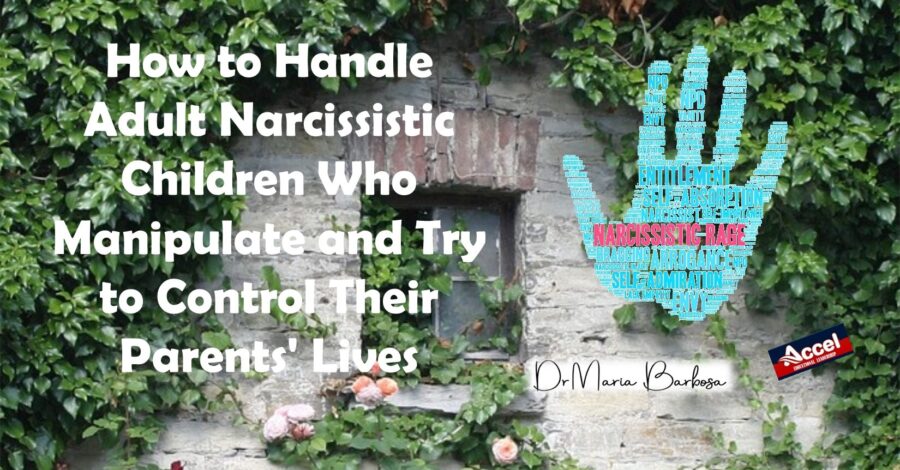How to Handle Adult Narcissistic Children Who Manipulate and Try to Control Their Parents’ Lives
Dealing with adult narcissistic children can be one of the most challenging experiences for parents. Narcissistic traits in adult children often manifest as manipulative behavior, a need for control, and a lack of empathy toward their parents. These behaviors can create a toxic dynamic that drains the emotional and mental well-being of the parents. However, there are strategies that parents can implement to protect themselves and manage the relationship in a healthier way. Here’s how to handle adult narcissistic children who manipulate and try to control their parents’ lives.
Understanding Narcissistic Behavior in Adult Children
Traits of Narcissistic Adult Children: Adult children with narcissistic traits often exhibit behaviors that are deeply self-centered and manipulative. These behaviors can include:
- Manipulation: Using guilt, fear, or emotional blackmail to get what they want from their parents.
- Lack of Empathy: Showing little concern for their parents’ feelings or well-being, focusing instead on their own needs and desires.
- Entitlement: Believing that they are owed something by their parents, whether it’s financial support, time, or attention.
- Control: Attempting to dictate or interfere in their parents’ decisions, relationships, and lives.
- Blame-Shifting: Refusing to take responsibility for their actions and blaming their parents for any issues or conflicts.
- These behaviors can make it extremely difficult for parents to maintain a healthy, respectful relationship with their adult child.
Strategies for Managing the Relationship
1. Set and Enforce Clear Boundaries: One of the most important steps in managing a relationship with a narcissistic adult child is to establish clear boundaries. These boundaries should outline what is acceptable behavior and what is not, and they should be communicated firmly and consistently.
Key Tips:
- Be specific: Clearly define the behaviors that are unacceptable, such as manipulative tactics, disrespectful language, or unwelcome interference in your life decisions.
- Stay consistent: Once boundaries are set, it’s crucial to enforce them consistently, even if it leads to temporary conflict.
- Be prepared for pushback: Narcissistic individuals often resist boundaries, but it’s important to stand your ground.
2. Limit Financial and Emotional Dependency: Narcissistic adult children may try to control their parents by creating financial or emotional dependency. To protect yourself, it’s important to establish independence in these areas.
Key Tips:
- Evaluate financial support: If your adult child is financially dependent on you, consider setting limits or gradually reducing support to encourage their independence.
- Avoid enabling: Refrain from enabling manipulative behavior by giving in to unreasonable demands, whether financial or emotional.
- Encourage responsibility: Encourage your adult child to take responsibility for their own life decisions and consequences.
3. Prioritize Your Own Well-Being: When dealing with a narcissistic adult child, it’s easy to become consumed by their demands and needs. However, it’s essential to prioritize your own well-being, both mentally and emotionally.
Key Tips:
- Practice self-care: Engage in activities that promote your mental and physical health, such as exercise, hobbies, or spending time with supportive friends.
- Seek support: Consider talking to a therapist or joining a support group for parents of narcissistic children. Professional support can provide valuable coping strategies and emotional relief.
- Maintain independence: Focus on your own interests and goals, rather than allowing your adult child’s needs to dominate your life.
4. Communicate Assertively: Effective communication is crucial when dealing with a narcissistic adult child. It’s important to be assertive in your communication, clearly expressing your needs and boundaries without being aggressive or confrontational.
Key Tips:
- Use “I” statements: Frame your concerns in a way that reflects your feelings and needs, such as “I feel disrespected when…” rather than blaming the child.
- Avoid power struggles: Narcissistic individuals may try to engage you in arguments or power struggles. Stay calm and avoid getting drawn into these conflicts.
- Stay focused: Keep the conversation focused on the specific issue at hand, rather than allowing it to spiral into unrelated grievances.
5. Be Prepared to Limit Contact: In some cases, it may be necessary to limit contact with a narcissistic adult child to protect your own well-being. This decision is never easy, but it can be crucial for maintaining your mental and emotional health.
Key Tips:
- Evaluate the impact: Consider how the relationship affects your mental and emotional health, and whether limiting contact is necessary for your well-being.
- Set clear guidelines: If you decide to limit contact, establish clear guidelines for when and how you will communicate with your adult child.
- Be firm: Stick to your decision, even if your adult child reacts negatively or tries to manipulate you into changing your mind.
6. Seek Professional Guidance: Dealing with a narcissistic adult child can be emotionally taxing, and it may be helpful to seek professional guidance. A therapist or counselor can provide strategies for managing the relationship and maintaining your mental health.
Key Tips:
- Choose the right therapist: Look for a therapist who has experience working with family dynamics and narcissistic personality traits.
- Consider family therapy: If your adult child is willing, family therapy can help address underlying issues and improve communication.
- Focus on your needs: Therapy can help you develop coping strategies, set boundaries, and prioritize your own well-being.
Keep in mind: Handling a relationship with an adult narcissistic child who manipulates and tries to control your life is undoubtedly challenging, but it is possible to manage the situation in a way that protects your mental and emotional health. By setting clear boundaries, limiting financial and emotional dependency, prioritizing self-care, communicating assertively, and seeking professional guidance, you can take steps to regain control of your life and maintain a healthier relationship with your adult child. Remember, it’s important to prioritize your well-being and make decisions that are in your best interest, even if it means limiting contact with your adult child.
How to Handle the Bad Verbal Behavior of Adult Narcissistic Children Toward Their Elderly Parents
When adult narcissistic children direct their bad verbal behavior toward their elderly parents, it can create a deeply distressing and toxic environment. This situation can be especially challenging because elderly parents may feel vulnerable, powerless, and emotionally overwhelmed. However, there are strategies that can help manage this behavior and protect the well-being of the parents involved. Here’s how to handle the bad verbal behavior of adult narcissistic children toward their elderly parents.
The Impact on Elderly Parents: Verbal abuse from a narcissistic adult child can lead to a range of negative outcomes for elderly parents, including increased stress, anxiety, depression, and a sense of isolation. Over time, the ongoing abuse can erode the parent’s self-esteem and sense of self-worth, leaving them feeling trapped and helpless in the relationship.
Strategies for Managing and Mitigating Verbal Abuse
1. Establish Clear Boundaries: Setting and enforcing clear boundaries is essential when dealing with verbal abuse from a narcissistic adult child. Elderly parents must communicate their limits and assert what behavior is acceptable and what is not.
Key Tips:
- Clearly state your boundaries: Let your adult child know that verbal abuse, such as yelling or derogatory comments, is unacceptable. Be specific about what behavior will not be tolerated.
- Enforce consequences: If the abusive behavior continues, follow through with consequences, such as limiting contact or ending conversations when the abuse occurs.
- Stay firm: It’s important for elderly parents to remain consistent in enforcing these boundaries, even if it leads to conflict or resistance.
2. Seek Support from Other Family Members or Caregivers: In some cases, elderly parents may need additional support from other family members, friends, or caregivers to manage the situation. Having a support network can provide both emotional backing and practical assistance.
Key Tips:
- Involve other family members: If possible, enlist the help of other family members who understand the situation and can offer support or intervene when necessary.
- Consider a caregiver: If the situation is particularly difficult, having a trusted caregiver present during interactions with the narcissistic adult child can provide an extra layer of protection and support.
- Document the abuse: Keeping a record of the verbal abuse can be useful if other family members or professionals need to intervene.
3. Disengage When Necessary: When verbal abuse escalates, elderly parents should feel empowered to disengage from the conversation or interaction. This can help prevent further emotional harm and de-escalate the situation.
Key Tips:
- Politely exit the conversation: If the verbal abuse becomes too intense, calmly state that you will not continue the conversation if it involves yelling or abusive language, and then disengage.
- Take a break: If necessary, take a break from interacting with the narcissistic adult child for a while to allow emotions to cool down and protect your own mental health.
- Avoid escalating the situation: Try to remain calm and avoid responding to abuse with anger, as this can escalate the situation further.
4. Prioritize Self-Care and Mental Health: Elderly parents need to prioritize their own self-care and mental health, especially when dealing with a narcissistic adult child. Taking care of their well-being is crucial for maintaining the strength and resilience needed to handle difficult interactions.
Key Tips:
- Engage in self-care activities: Regularly engage in activities that bring joy, relaxation, and emotional relief, such as hobbies, socializing with friends, or spending time in nature.
- Seek professional support: Consider speaking with a therapist or counselor who specializes in working with elderly individuals. They can provide coping strategies and emotional support.
- Practice stress-reduction techniques: Techniques like meditation, deep breathing, and mindfulness can help manage stress and keep emotions balanced during challenging interactions.
5. Evaluate the Relationship and Seek Legal Advice if Necessary: In extreme cases, where verbal abuse is severe and persistent, it may be necessary to evaluate the overall relationship and consider seeking legal advice to protect the elderly parent’s well-being.
Key Tips:
- Assess the impact: Reflect on how the relationship is affecting the elderly parent’s mental and emotional health. If the abuse is causing significant harm, it may be time to consider more drastic measures.
- Limit or cut off contact: If necessary, the elderly parent may need to limit or even cut off contact with the narcissistic adult child to protect their own well-being.
- Seek legal advice: In cases where verbal abuse escalates to threats or harassment, it may be advisable to seek legal advice or protection, such as a restraining order, to ensure the safety of the elderly parent.
Keep in mind: Handling the bad verbal behavior of adult narcissistic children toward their elderly parents is a challenging and emotionally taxing experience. However, by establishing clear boundaries, seeking support from other family members or caregivers, disengaging when necessary, prioritizing self-care, and evaluating the relationship, elderly parents can take steps to protect their well-being and manage these difficult interactions more effectively. It’s important to remember that no one deserves to be verbally abused, and taking action to safeguard one’s mental and emotional health is crucial, even in the context of a parent-child relationship.
By: Maria Pinto Barbosa PhD #DrBarbosa
WhatsApp: 01-386-206-6325 for client scheduling appointment
Certified as School Board of Education / PHD-Doctor of Philosophy in Cristian Clinical Counseling. ACCEL-Holistic Life Coach / Founder-Director of ACCEL Educational Leadership. Specialized on Temperaments – Personalities.
Discover more from Dr Maria Barbosa
Subscribe to get the latest posts sent to your email.





